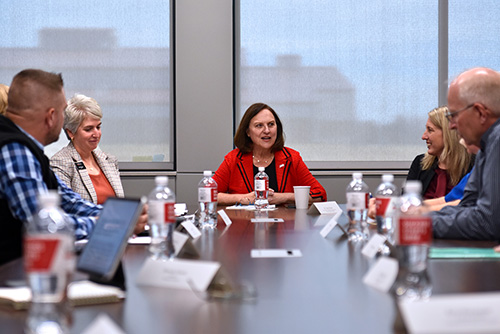NORFOLK, Neb. – A member of Nebraska’s congressional delegation was in Norfolk recently for a discussion on the use of technologies that lead to better efficiencies on farms and in the ag industry.
U.S. Sen. Deb Fischer met with ag industry leaders and representatives of Northeast Community College Wednesday at the Acklie College Farm for a roundtable discussion on the future of precision agriculture and the technology necessary to maximize its effectiveness. In addition to Northeast, others at the table represented implement dealers, irrigation manufacturers, commodity and livestock organizations, ag producers, and farm groups.
Following the meeting, Fischer told reporters that it was important to bring together the groups to hear of new technologies and advancements in precision ag that are forthcoming. One issue she did hear during the roundtable concerned adequate broadband connectivity in rural areas to use such technology.
“You have to be able to have a reliable system where you can, first of all, manage the information that you're going to gather but to be able to know what your soil is like. What are your soil needs? Do you need to put any nutrients in the soil? How much water do your plants need - and to measure that at different areas across the field to be able to monitor animals and feedlot,” she said. … “(Precision agriculture) just helps the producers to be able to be better stewards of their land and of their lifestyle.”
Fischer said there has to be a plan to address areas that are underserved or have no broadband connectivity. She said the previous Farm Bill and the Infrastructure Bill approved earlier this year includes approximately $200 million to deploy broadband to unserved and underserved areas.
Northeast Community College initiated its precision agriculture program in 2016. Students develop technical skills to learn to interpret, analyze, and utilize data gathered from precision agriculture technologies to improve production. Graduates are employed as technicians and producers in a rapidly changing industry that is focused on maximizing yield potential through resource efficient practices.
Tara Smydra, dean of science, math, agriculture, and technology at Northeast, said the College’s precision ag program focuses on using technology as a management-decision making tool.
“It's not always about the technologies that you use. It’s about the data you collect and how you use it,” Smydra said. “Students have to have a really strong understanding of that so they can be the right people who work for their employer and to produce for Nebraska. We also want our students to understand the stewardship involved with precision ag and to communicate strongly and clearly just how beneficial it can be for businesses and producers.”
Fischer said college students have many opportunities in agriculture that utilize precision ag technology from ag business to production agriculture. Filling such positions will also help address a labor shortage impacting the industry.
“Listening to companies that were in the roundtable today … they were talking to Dr. (Leah) Barrett (Northeast President) about bringing interns from Northeast Community College and having them work in their company - whether it's an irrigation company, or whether it's an implement dealer or manufacturing company. We're so lucky to have so many of them all across the state … and make those connections to offer those experiences to students here at Northeast Community College. I think that's going to be really a great opportunity for these (students).”
Following the roundtable, Fischer was given a tour of Northeast’s new Veterinary Technology and Farm Operations buildings on the Acklie College Farm.
--###--
PHOTO CUTLINE
Nebraska U.S. Senator Deb Fischer speaks during a roundtable discussion on precision agriculture on the Acklie College Farm at Northeast Community College on Wednesday. Dr. Leah Barrett, president of Northeast (left), Dr. Tracy Kruse, vice president of development and external affairs (right), and representatives from implement dealers, irrigation manufacturers, commodity and livestock organizations, ag producers, and farm groups participated in the discussion.

